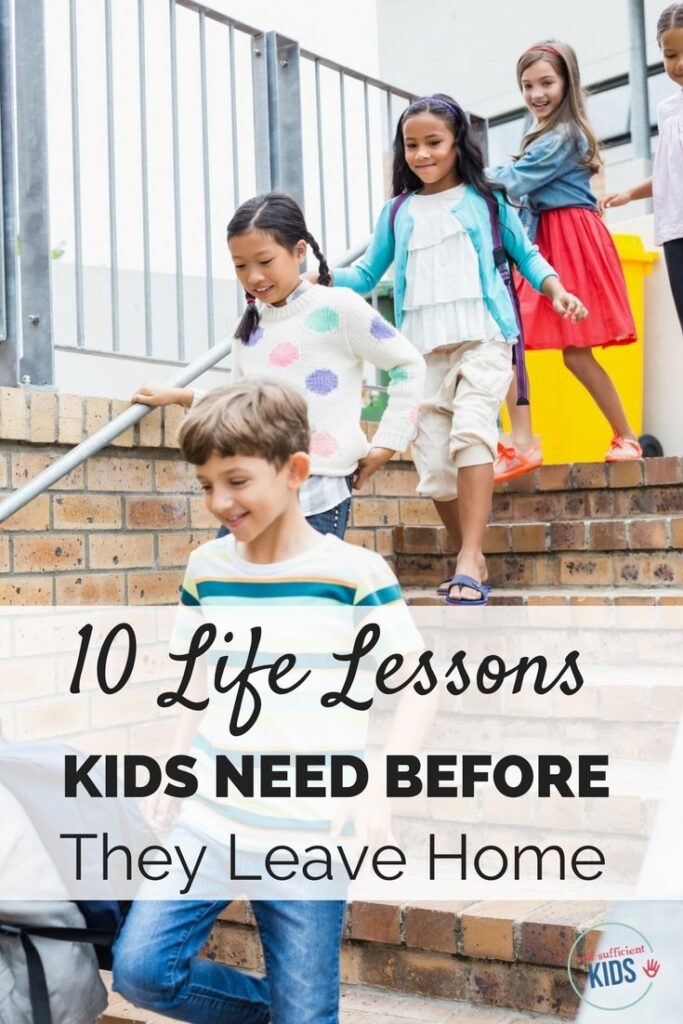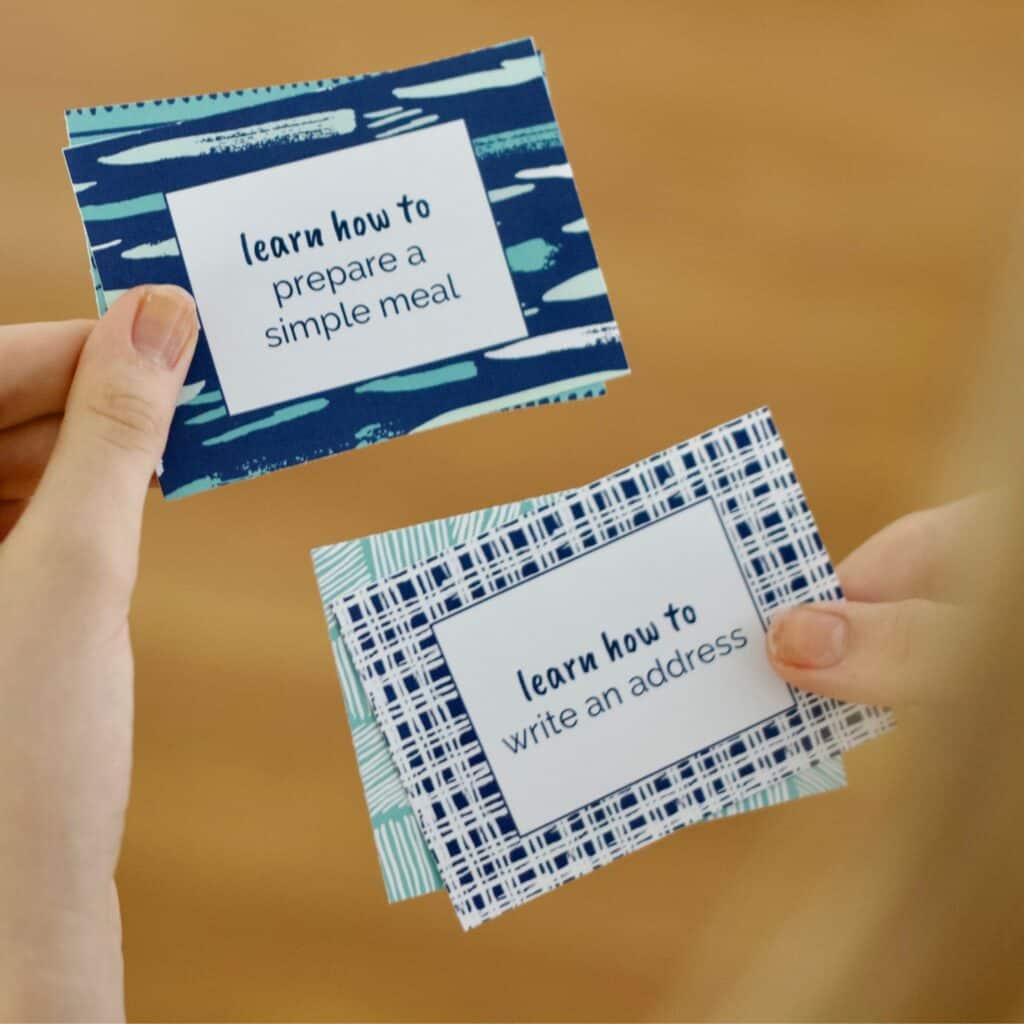10 Life Lessons Kids Need to Experience Before They Leave Home
Kids and teens need to experience these ten life lessons before heading out into the world on their own.
To see more ideas on how to raise confident, independent adults see: 15 Life Skills Kids Need Before They Leave Home

(This post contains affiliate links. If you click on a link and purchase the item, I will receive a commission at no extra cost to you.)
As adults, we’ve more or less learned what it takes to be successful in life. So naturally, we want to pass that knowledge onto our kids.
We want our kids to know how to stick up for themselves, handle disappointment and failure, resolve conflict, and manage time and resources. And because we know how to do these things, it feels like our responsibility to make sure our kids are getting it right from the very beginning.
So we wake them up for school in the morning, talk to their teachers about an unfair grade, ask their soccer coach why our child hasn’t been played this season, and sit next to our kids as they complete their homework.
The problem is that by doing all these things for our kids, we aren’t letting them learn these skills on their own. These lessons can only be learned by making decisions and choices on their own and facing down fears.
While our kids are at home we have the opportunity to coach and mentor them in their growing independence. We have the chance to be a listening ear for when they face a challenge and support them as they think through their own choices and experience the consequences.
10 Life Lessons Kids Need to Experience Before They Leave Home
Listed below are ten life lessons we need to let our kids experience on their own before they leave home. Learning these lessons while they’re young will help our children live with greater confidence in the world beyond our doors.
Talk to Important Adults and Self-Advocate
There are many times when adults have to advocate for themselves, such as asking a boss for a raise, letting a stranger know they accidentally cut them in line or telling a waiter that he didn’t add up the bill correctly.
These situations can sometimes be tricky, but imagine if we’d never been given the chance to practice standing up for ourselves, with teachers, coaches or peers?
While it may be tempting, and occasionally necessary at times for parents to speak up and advocate for their kids, this should be the exception, not the rule. Instead, embrace opportunities when your kids can take the lead and stand up for themselves. These moments will help build kids’ confidence and set them up for greater success as adults.
Parents can also coach kids through tricky situations by being willing to listen and offering advice if it’s asked for. Sometimes kids just need to talk about difficult situations in order to figure out a solution on their own. Know too that kids are watching you and taking notes on what you do if you need to advocate for yourself.
This is a great story about what can happen when parents let their kids discuss challenges with important adults on their own with no parental involvement: When Your Child is Ready to Quit, Tell Them This
See related:
Helping Your Teen Self-Advocate
Talk With Strangers
Out in the world on their own, our kids will encounter many strangers such as advisors, landlords, store clerks, hairdressers, waiters, managers, and co-workers just to name a few.
Our adult kids need to know how to look these people in eye, clearly communicate with them, and possibly even advocate for themselves if need be. But if kids have never been encouraged to speak to strangers on their own – if their parents have always spoken for them – kids’ communication skills will be stilted which could, among other things, come across poorly in a job interview.
And that advice parents give to kids about “not talking to strangers”? Statistics show it’s more likely your TV set will fall on your child’s head than a stranger will abduct him or her. Try a different approach that lets kids know that not all strangers are bad. For example, one Mom told her kids that if they ever get lost to look for another mom with kids because she’ll most likely be willing to help.
Confront Conflict
People who aren’t afraid to confront conflict end up being more successful in both their personal and business relationships. Unaddressed conflict breeds resentment and hinders progress.
Seeing your child in a challenging situation with peers or important adults can be painful. But each time we insert ourselves into a conflict – big or small – we’re robbing our children of the chance to build the social skills necessary to address conflict in a way that is both respectful and self-advocating.
This doesn’t mean that we can’t serve as coaches when kids come to us with their relationship issues. One of the best ways we can be supportive is to try to help our children think through the appropriate words to use and which steps to take if a situation isn’t getting better.
Bullying is another matter and a situation where it might make sense for parents to get involved. This guide can help: What Parents Can Do About Childhood Bullying
See related:
Why Avoiding Conflict Keeps You Trapped in it Forever
How to Help Kids to Stand Up for Themselves
Coaching Children in Handling Every Day Conflicts

Respectfully Disagree
Being respectful doesn’t always come naturally to kids – they need our help to understand the right way to communicate their frustration or disapproval.
Parents can help kids learn how to be respectful by talking to them about appropriate ways to respond. A few ways that parents can help kids learn how to respectfully disagree include:
- Modeling respectful disagreement, either with spouses, friends, or store employees
- Letting kids know that it’s OK to disagree but that they need to express that disagreement in a respectful manner
- Coaching kids on the respectful way they could disagree with you
- Make sure kids feel that they are heard when disagreeing with you. Anyone who feels that their position is not being heard is more likely to dig in their heels rather than discuss the issue at hand.
Learning how to talk to other kids and adults in a respectful manner without fear pays dividends in adulthood when disagreements arise between spouses, co-workers or employers.
See related:
Why Every Kid Should Talk Back to Their Parents
Teaching Your Child to Respectfully Disagree
Experience Failure
Failure is tough. And seeing your kids fail? Even tougher.
But as difficult as it is to sit on the sidelines and see our kids make mistakes, failure is full of big lessons.
As Jessica Lahey, author of the book “The Gift of Failure” says, when parents correct their kid’s mistakes, they’re helping in the moment but ultimately doing harm. Kids who have never had to deal with failure find themselves unable to cope as adults when a relationship goes sour or a work project doesn’t pan out.
“All this swooping and fixing make for emotionally, intellectually, and socially handicapped children,” she writes, “unsure of their direction or purpose without an adult on hand to guide them.”
Read more about the importance of letting kids fail here: How to Give Your Child the Gift of Failure
Experience Disappointment
Certainly, no parent would want to thrust their child into a situation just so they can experience disappointment but often our parental instinct is to shield kids from the downtrodden feeling that comes from events not turning out the way we expected.
Trying to appease kids with excessive affection or even giving them gifts as a way to protect them from feeling disappointment may appear to help in the short term but ultimately could do more harm than good. It’s healthier for kids to sit with their disappoint and reflect on their emotions to hopefully problem solve how to avoid disappointment in the future (if possible).
Appeasing kids may send the message that you don’t think they’re capable of handling and overcoming setbacks.
That said, disappointment is a difficult emotion and some kids may quit or reduce their effort after experiencing it. Parents can support and coach kids through their disappointment by asking: “I know you feel bad right now, but what can you learn from this experience?”
Other ways that parents can help include:
- Make sure your kids know that you love them through both their successes and stumbling blocks
- Try to offer a healthy perspective on disappointment
- Help kids try to find a way to overcome the causes of their disappointment
- Assure kids that they will get over this disappointing stage and can achieve their goals through hard work
See related:
Parenting: Disappointment is Good
That’s Life: Helping Kids Deal With Disappointment
Failure is an Option: Teaching Your Child to Cope With Disappointment
Ready to teach your child life skills? These cards can help! Each card in this eighty-one deck contains a skill your child can begin practicing with you or on their own. Click here or the image below to learn more.
Make a Big Decision
Once our kids are out in the world on their own there will be many big decisions to make: Which college major to choose, where to work, where to live, and who to keep as company.
It can be tempting to make decisions for our kids such as which classes to take, which sports to pursue, how to spend one’s summer. And while we may feel we know best, making these decisions for our kids sends the message that they are not capable of making good choices on their own, weakening their self-confidence.
Instead, parents can act as coaches making it clear that the teen or child is the one who ultimately makes the final decision (within reason, of course) but providing some guidance and perspective they perhaps haven’t considered.
See related:
How to Help Your Teen Develop The Ability to Make Good Decisions
Get Bored
The opportunities are endless as far as kids activities go. It really is possible for kids and teens to be constantly busy or entertained.
But building some time into the week or vacations when nothing is planned or scheduled can be so valuable to kids. Research shows that it’s during downtime that creativity flourishes and people are able to reflect on their emotions, relationships, challenges, and life in general.
We all know adults who go a mile a minute but have yet to find peace and happiness within. Letting our kids discover that downtime can be rejuvenating will help them see the value in slowing down and feeling peace in their lives.
See related:
Giving Our Kids the Gift of Doing Nothing
The Psychological Importance of Wasting Time
Manage Time
The more kids understand how to manage their time before going off to live on their own, the more successful they’ll be.
Managing one’s time to get out the door for school and prioritizing homework over playtime are lessons kids need to learn. These lessons will help them later in life when kids need to manage a busy college schedule or determine in which order to get work projects done.
While it might be tempting to simply dictate when kids should do which activities in what order, kids will learn best if they’re able to practice time management independently.
Bullet four in this article, Don’t Procrastinate! Teach Your Child Time Management is an especially helpful tip for getting kids to begin taking ownership of their time management.
See related:
The Trick to Getting Kids to Manage Their Time and Get Things Done (Without Nagging)
Self-Navigate
Not every kid lives in a city, but whenever possible it’s helpful for kids to get a sense of how to navigate public transportation on their own. If you find yourself looking over a map to see where you need to go, get your kids involved. Or when taking public transportation, ask your children to figure out how to get to the correct train or bus.
Or you could do as the Japanese do and let your kids go on errands as young as 2 or 3.
But if that’s too young for your taste, it’s still worth considering some of the advantages of letting kids roam safe neighborhoods and cities on their own, as this Atlantic article points out: Let Your Kids Ride the Bus Alone
You may also like:
15 Life Skills Kids Need Before They Leave Home
Why Your Kids Need Chores to be Successful in Life
Why Every Kid Should Talk Back to Their Parents
At What Age Can Kids Stay Home Alone?
What to do next…
1. Subscribe to Self-Sufficient Kids’ email list.
Like what you read here and want to learn more? Every Thursday I’ll send you one parenting tip about raising self-sufficient kids and creating the peaceful relationship you yearn to have with your child. Click here to sign up.
2. Take one of my quizzes!
Find out if you’re raising a self-sufficient kid (click here) or if you’re doing too much for your kids (click here). At the end of each quiz, you’ll be asked to provide your email address to see the results.
3. Get your kids started on chores.
Learn how to get your child started on chores (& keep them motivated + avoid power struggles) by enrolling in my Get Your Kids Successfully Started on Chores course. Click here to learn more and sign up.

About Kerry Flatley
Hi! I’m Kerry, the mother of two girls and a certified parent educator. I believe it is possible for parents to have a supportive, loving, and warm relationship with their kids while raising them to be independent and ultimately self-sufficient. Over the years, I’ve read numerous books and articles that support this belief and I’ve put these ideas into practice with my own kids. Read more about me and Self-Sufficient Kids here.


